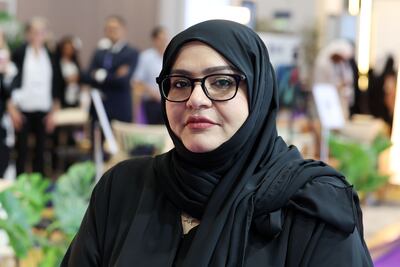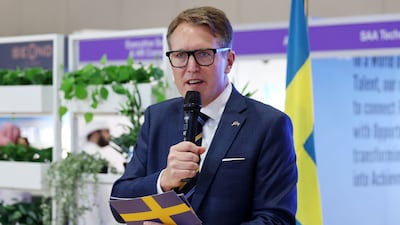Sweden's ambassador to the UAE, Fredrik Floren, said his country's pavilion at a jobs fair for UAE citizens showed its commitment to Emiratisation.
The nation's embassy used the Tawdheef X Zaheb event in Abu Dhabi to promote Swedish companies in the UAE as potential workplaces for Emiratis. Swedish companies represented at the event included Ikea, aerospace company Saab, agricultural manufacturing company Alfa Laval and industrial manufacturer Atlas Copco.
Mr Floren told The National that his country's presence at the fair reflected its long-standing commitment to the region. "There are more than 200 [Swedish] companies in the country who have been here since the 1960s," he said.
He has visited 45 Swedish companies in the UAE since taking on his current role late last year. He has seen first-hand the vital contribution Emiratis are making in the workplace, he added.
Opportunity knocks
The fair, which runs until November 21 at the Abu Dhabi National Exhibition Centre, represented an opportunity for companies to find the best Emirati talent, said Vinod Jayan, managing director of Al Futtaim-Ikea.
"We want to hire Emiratis because they know the culture the best and are the future of this country," he said. "It's a symbol of commitment to the country I operate in. All we can tell them [Emiratis] is, come with an open mind and a passion for learning in a collaborative environment, and be humble, which is very much part of Emirati culture."
The UAE's Emiratisation drive aims to increase the number of citizens working in the private sector. Under the drive, companies have until December 30 to take the total workforce representation to 6 per cent. First introduced in September 2022, the targets increase by 1 per cent increase every six months. The goal is for a 2 per cent annual increase to reach 10 per cent by the end of 2026. Smaller businesses with 20 to 49 employees must hire at least one Emirati in a skilled position by the end of this year and another by next year.
Helene Bittmann, managing director of Saab Middle East, spoke about the opportunities available to young UAE citizens. There is a need for talent in the engineering sector, as well as business development, finance and HR, she said.
"The Emiratis that I've been working with so far have shown a strong interest to learn more and are very open minded, they see the bigger picture and they are very ambitious."
Emirati experiences
Sameera Al Hosani, customer service manager in Ikea, who started out in a sales position 12 years ago, said there were not many Emiratis working in the private sector when she first joined the company.
“I really wanted to prove that I could work and perform anywhere as an Emirati," she said. “I was handed mornings shifts, but I wanted to break the routine so I took different shifts, including the closing shift. Anyone who works on themselves can develop and lead fulfilling roles with effort and perseverance."
Mariam Al Tameemi, an engineer at Alfa Laval, said she was immediately made to feel at home at the company. "Ever since I joined, I felt safe and the energy in the company was very co-operative, they welcomed me then as their first Emirati employee," she added.
UAE currency: the story behind the money in your pockets
Killing of Qassem Suleimani
Final results:
Open men
Australia 94 (4) beat New Zealand 48 (0)
Plate men
England 85 (3) beat India 81 (1)
Open women
Australia 121 (4) beat South Africa 52 (0)
Under 22 men
Australia 68 (2) beat New Zealand 66 (2)
Under 22 women
Australia 92 (3) beat New Zealand 54 (1)
The%20specs
%3Cp%3E%3Cstrong%3EPowertrain%3A%20%3C%2Fstrong%3ESingle%20electric%20motor%0D%3Cbr%3E%3Cstrong%3EPower%3A%20%3C%2Fstrong%3E201hp%0D%3Cbr%3E%3Cstrong%3ETorque%3A%20%3C%2Fstrong%3E310Nm%0D%3Cbr%3E%3Cstrong%3ETransmission%3A%20%3C%2Fstrong%3ESingle-speed%20auto%0D%3Cbr%3E%3Cstrong%3EBattery%3A%20%3C%2Fstrong%3E53kWh%20lithium-ion%20battery%20pack%20(GS%20base%20model)%3B%2070kWh%20battery%20pack%20(GF)%0D%3Cbr%3E%3Cstrong%3ETouring%20range%3A%20%3C%2Fstrong%3E350km%20(GS)%3B%20480km%20(GF)%0D%3Cbr%3E%3Cstrong%3EPrice%3A%20%3C%2Fstrong%3EFrom%20Dh129%2C900%20(GS)%3B%20Dh149%2C000%20(GF)%0D%3Cbr%3E%3Cstrong%3EOn%20sale%3A%3C%2Fstrong%3E%20Now%3C%2Fp%3E%0A
SCORES
Multiply Titans 81-2 in 12.1 overs
(Tony de Zorzi, 34)
bt Auckland Aces 80 all out in 16 overs
(Shawn von Borg 4-15, Alfred Mothoa 2-11, Tshepo Moreki 2-16).
KILLING OF QASSEM SULEIMANI
HAJJAN
%3Cp%3EDirector%3A%20Abu%20Bakr%20Shawky%C2%A0%3C%2Fp%3E%0A%3Cp%3E%3Cbr%3EStarring%3A%20Omar%20Alatawi%2C%20Tulin%20Essam%2C%20Ibrahim%20Al-Hasawi%C2%A0%3C%2Fp%3E%0A%3Cp%3E%3Cbr%3ERating%3A%204%2F5%3C%2Fp%3E%0A
Pakistanis%20at%20the%20ILT20%20
%3Cp%3EThe%20new%20UAE%20league%20has%20been%20boosted%20this%20season%20by%20the%20arrival%20of%20five%20Pakistanis%2C%20who%20were%20not%20released%20to%20play%20last%20year.%20%0D%3Cbr%3E%0D%0D%0D%3Cbr%3E%3Cstrong%3EShaheen%20Afridi%20(Desert%20Vipers)%20%3C%2Fstrong%3E%0D%3Cbr%3ESet%20for%20at%20least%20four%20matches%2C%20having%20arrived%20from%20New%20Zealand%20where%20he%20captained%20Pakistan%20in%20a%20series%20loss.%20%0D%3C%2Fp%3E%0A%3Cp%3E%3Cstrong%3EShadab%20Khan%20(Desert%20Vipers)%20%3C%2Fstrong%3E%0D%3Cbr%3E%0DThe%20leg-spin%20bowling%20allrounder%20missed%20the%20tour%20of%20New%20Zealand%20after%20injuring%20an%20ankle%20when%20stepping%20on%20a%20ball.%20%0D%3C%2Fp%3E%0A%3Cp%3E%3Cstrong%3EAzam%20Khan%20(Desert%20Vipers)%20%3C%2Fstrong%3E%0D%3Cbr%3EPowerhouse%20wicketkeeper%20played%20three%20games%20for%20Pakistan%20on%20tour%20in%20New%20Zealand.%20He%20was%20the%20first%20Pakistani%20recruited%20to%20the%20ILT20.%20%0D%3C%2Fp%3E%0A%3Cp%3E%3Cstrong%3EMohammed%20Amir%20(Desert%20Vipers)%20%3C%2Fstrong%3E%0D%3Cbr%3EHas%20made%20himself%20unavailable%20for%20national%20duty%2C%20meaning%20he%20will%20be%20available%20for%20the%20entire%20ILT20%20campaign.%20%0D%3C%2Fp%3E%0A%3Cp%3E%3Cstrong%3EImad%20Wasim%20(Abu%20Dhabi%20Knight%20Riders)%20%3C%2Fstrong%3E%0D%3Cbr%3EThe%20left-handed%20allrounder%2C%2035%2C%20retired%20from%20international%20cricket%20in%20November%20and%20was%20subsequently%20recruited%20by%20the%20Knight%20Riders.%26nbsp%3B%3C%2Fp%3E%0A
The specs: 2018 Opel Mokka X
Price, as tested: Dh84,000
Engine: 1.4L, four-cylinder turbo
Transmission: Six-speed auto
Power: 142hp at 4,900rpm
Torque: 200Nm at 1,850rpm
Fuel economy, combined: 6.5L / 100km
Asia Cup Qualifier
Venue: Kuala Lumpur
Result: Winners play at Asia Cup in Dubai and Abu Dhabi in September
Fixtures:
Wed Aug 29: Malaysia v Hong Kong, Nepal v Oman, UAE v Singapore
Thu Aug 30: UAE v Nepal, Hong Kong v Singapore, Malaysia v Oman
Sat Sep 1: UAE v Hong Kong, Oman v Singapore, Malaysia v Nepal
Sun Sep 2: Hong Kong v Oman, Malaysia v UAE, Nepal v Singapore
Tue Sep 4: Malaysia v Singapore, UAE v Oman, Nepal v Hong Kong
Thu Sep 6: Final
Asia Cup
Venue: Dubai and Abu Dhabi
Schedule: Sep 15-28
Teams: Afghanistan, Bangladesh, India, Pakistan, Sri Lanka, plus the winner of the Qualifier
UAE currency: the story behind the money in your pockets
Our legal consultant
Name: Dr Hassan Mohsen Elhais
Position: legal consultant with Al Rowaad Advocates and Legal Consultants.
Small%20Things%20Like%20These
%3Cp%3EDirector%3A%20Tim%20Mielants%3Cbr%3ECast%3A%20Cillian%20Murphy%2C%20Emily%20Watson%2C%20Eileen%20Walsh%3Cbr%3ERating%3A%204%2F5%3C%2Fp%3E%0A
The rules on fostering in the UAE
A foster couple or family must:
- be Muslim, Emirati and be residing in the UAE
- not be younger than 25 years old
- not have been convicted of offences or crimes involving moral turpitude
- be free of infectious diseases or psychological and mental disorders
- have the ability to support its members and the foster child financially
- undertake to treat and raise the child in a proper manner and take care of his or her health and well-being
- A single, divorced or widowed Muslim Emirati female, residing in the UAE may apply to foster a child if she is at least 30 years old and able to support the child financially
Lexus LX700h specs
Engine: 3.4-litre twin-turbo V6 plus supplementary electric motor
Power: 464hp at 5,200rpm
Torque: 790Nm from 2,000-3,600rpm
Transmission: 10-speed auto
Fuel consumption: 11.7L/100km
On sale: Now
Price: From Dh590,000
More from Neighbourhood Watch:
The biog
Favourite hobby: I love to sing but I don’t get to sing as much nowadays sadly.
Favourite book: Anything by Sidney Sheldon.
Favourite movie: The Exorcist 2. It is a big thing in our family to sit around together and watch horror movies, I love watching them.
Favourite holiday destination: The favourite place I have been to is Florence, it is a beautiful city. My dream though has always been to visit Cyprus, I really want to go there.
Joker: Folie a Deux
Starring: Joaquin Phoenix, Lady Gaga, Brendan Gleeson
Director: Todd Phillips
Rating: 2/5
ARGENTINA SQUAD
Goalkeepers: Franco Armani, Agustin Marchesin, Esteban Andrada
Defenders: Juan Foyth, Nicolas Otamendi, German Pezzella, Nicolas Tagliafico, Ramiro Funes Mori, Renzo Saravia, Marcos Acuna, Milton Casco
Midfielders: Leandro Paredes, Guido Rodriguez, Giovani Lo Celso, Exequiel Palacios, Roberto Pereyra, Rodrigo De Paul, Angel Di Maria
Forwards: Lionel Messi, Sergio Aguero, Lautaro Martinez, Paulo Dybala, Matias Suarez
Killing of Qassem Suleimani
The specs: 2018 Nissan Patrol Nismo
Price: base / as tested: Dh382,000
Engine: 5.6-litre V8
Gearbox: Seven-speed automatic
Power: 428hp @ 5,800rpm
Torque: 560Nm @ 3,600rpm
Fuel economy, combined: 12.7L / 100km
Red flags
- Promises of high, fixed or 'guaranteed' returns.
- Unregulated structured products or complex investments often used to bypass traditional safeguards.
- Lack of clear information, vague language, no access to audited financials.
- Overseas companies targeting investors in other jurisdictions - this can make legal recovery difficult.
- Hard-selling tactics - creating urgency, offering 'exclusive' deals.
Courtesy: Carol Glynn, founder of Conscious Finance Coaching
More on Quran memorisation:
The years Ramadan fell in May
Killing of Qassem Suleimani



